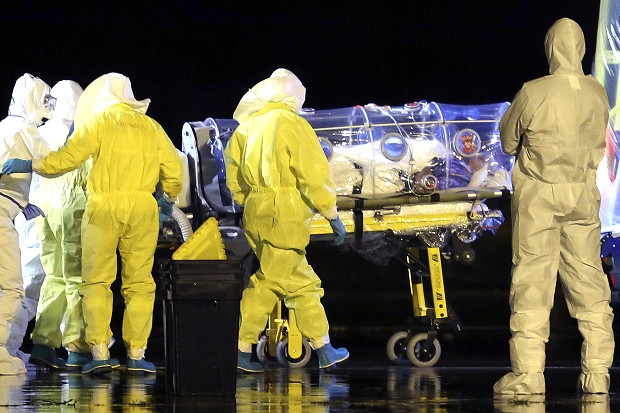Ebola Virus: Briton who Died in Macedonia Did Not Travel to Ebola Afflicted Countries

A Macedonian government spokesman has said that he could not confirm that Ebola was the cause of death of a Briton, who died in the capital, Skopje.
It was earlier reported that a British man had died of suspected Ebola in Macedonia and that a second Briton who was travelling with him was now exhibiting symptoms of the illness.
The spokesman said the second man had told the authorities they had travelled to Skopje directly from Britain and had not been in any country known to have Ebola outbreaks.
He said samples of blood and tissue had been taken from the deceased and were being sent to a laboratory in Frankfurt for analysis.
The Foreign Office said it was aware of the reports "and are looking into them urgently". A spokesperson said: "'Macedonian authorities have taken all safety protocols provided in this case according to international standards. The authorities immediately informed the World Health Organization."
If Ebola is found to be the cause of death, it would be the first fatality of a UK national from the deadly virus, which has so far killed more than 3,800 people in West Africa and has spread to North America and Europe.
The unnamed Britons were staying at a hotel in the Macedonian capital. Staff of the hotel have also been quarantined, as have the ambulance team and medical staff that treated the deceased. The hotel in Skopje has been sealed off.
Shutting borders will not stop Ebola, you have to root it out. The longer this goes on the more likely it is we may see a case in the UK. But the UK deals with things like this effectively, they (the authorities) handle it. They are ready enough and have the capacity.
The UK Foreign Office says it is now investigating the incident.
British nurse Will Pooley was cured of the virus last month after being treated at London's Royal Free hospital. He contracted the disease while working as a volunteer nurse in Sierra Leone.
Australia is also examining a possible case after an Ebola nurse returned to Queensland from Sierra Leone.
The Government, which previously said checks would be impractical and ineffective, announced "enhanced screening" for travellers arriving from Liberia, Sierra Leone and Guinea.
The tests will involve assessing their recent travel history, who they have been in contact with, and a possible medical assessment.
Concern about the virus spreading across Europe has grown since Spain confirmed it was dealing with the first confirmed case caught outside Africa.
The news came as ministers said passengers arriving at Heathrow and Gatwick airports and Eurostar train terminals are to be screened for signs of the disease.
But experts said 'shutting borders will not stop Ebola', as leading experts say the key to tackling the vicious virus is 'rooting it out' at the source, in West Africa.
Dr Ben Neuman, a virologist at the University of Reading, said: 'Shutting borders will not stop Ebola, you have to root it out."
I would say that in the 30 years I've been working in public health, the only thing like this has been AIDS.
He added: "The longer this goes on the more likely it is we may see a case in the UK. But the UK deals with things like this effectively, they (the authorities) handle it. They are ready enough and have the capacity. There are a lot of doctors and nurses here who have been out there (to West Africa) with Doctors Without Borders, and so who have Ebola experience, which is invaluable."
A U.S. health chief has warned the outbreak could become the 'next Aids', unless drastic action is taken to halt the crisis.
"We have to work now so that it is not the world's next AIDS," Centers for Disease Control and Prevention director Tom Frieden told the heads of the United Nations, World Bank and International Monetary Fund gathered in Washington.
"I would say that in the 30 years I've been working in public health, the only thing like this has been AIDS," he added.
The outbreak of the disease has already killed more than 3,000 people and infected more than 7,200 - mostly in West Africa.
© Copyright IBTimes 2025. All rights reserved.






















